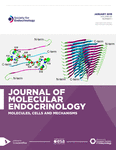Effects of ketoacidosis on rat apolipoprotein A1 gene expression: a link with acidosis but not with ketones
- MJ Haas,
- K Pun,
- D Reinacher,
- NC Wong and
- AD Mooradian
Abstract
To determine if ketoacidosis contributes to reduced apolipoprotein A1 (apoA1) expression in insulin-deficient diabetic rats, we examined the regulation of apoA1 gene expression in response to changes in ambient pH or ketone body concentrations. Hepatic apoAI mRNA levels were reduced 42% in diabetic rats relative to nondiabetic controls (means+/-s.d.; 321.8+/-43.7 vs 438.7+/-58.8 arbitrary units; P<0.03). Neither endogenous apoA1 mRNA nor transcriptional activity of the rat apoA1 gene promoter (from -474 to -7) were altered by sodium butyrate or isobutyramide (0.3 mM to 10 mM) in Hep G2 or Caco-2 cells. Rat hepatic and intestinal apoA1 mRNA levels, and plasma apoA1 concentration, were not altered 24 h after isobutyramide administration (500 mg/kg by gavage). When the effect of altering ambient pH within a wide range commonly encountered in vivo was studied, acidosis (pH 6.7), relative to alkalosis (pH 7.9), decreased apoAI mRNA levels relative to glyceraldehyde-3-phosphate dehydrogenase mRNA by 47% in Hep G2 cells (P<0.025) and by 24% in Caco-2 cells (P<0.017). Acidosis did not alter cytomegalo virus (CMV)-beta-galactosidase activity, or the activity of the simian virus (SV40) early-region promoter, in either cell line transfected with the respective constructs. The lowering of ambient pH was associated with a graded reduction in apoAI promoter activity. At pH 6.7, apoAI promoter activity was reduced by 75% compared with promoter activity at pH 7.9. These observations indicate that acidosis, but not ketosis, contributes to the reduction in apoA1 expression during diabetic ketoacidosis by down-regulating apoAI promoter activity.











